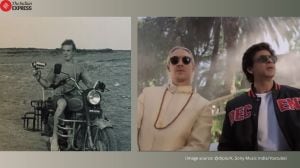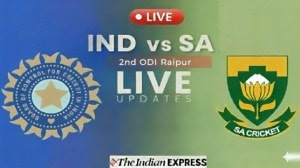On World Post Day, ‘lady postman’ recalls old days and ways
It wasn’t easy being one of the first postwomen in Delhi in the 1980s. Indrawati Deshwal, now 60, took an early-morning train from Rohtak...

It wasn’t easy being one of the first postwomen in Delhi in the 1980s. Indrawati Deshwal, now 60, took an early-morning train from Rohtak, where she lived then, sorted the mail, changed into her uniform, and walked miles carrying thousands of letters and packages for people who eagerly awaited the “lady postman” in the Gole Market area.
People even stopped by at the Gole Dak Khana to see her. She was one of the only two postwomen in those days. “It was certainly a big achievement. I was the first one to get a government job in my family,” said Deshwal, walking down the memory lane on the World Post Day.
In the last 25 years that she has worked in various capacities — she started out as a postwoman and now works as a stamp vender — Deshwal has enjoyed meeting people, making friends and even “reading faces”.
In the old Gole Dak Khana building, once called the Alexandra Place built by the British, Deshwal waited for customers on Thursday, as her children waited for her at home on Dussehra. None came.
With telephone and Internet order of the day, people no longer depend on letters. She misses the old days and the old ways.
When she walked in the gullies in her khaki uniform, with a sack of letters, children would call out her name. All of them recognised her. In time, she formed wonderful friendships. “I even helped labourers write letters. Things have now become too impersonal,” she said. Back then, she was often given sweets at the Bangla Sahib Gurdwara. “They were so nice. They used to say ‘gudiya dak le ke aa gayi’,” Deshwal recalled.
Her career as a postwoman spanned five years. “I don’t have any complaint against me. Work always came first.” A stamp vender now, Deshwal often does not have time for lunch. But she doesn’t mind. “With competition growing, I can’t afford to let my department down,” she said.
The Gole Dak Khana, too, has changed a little. Amid old, dusty files piled up in the corridors, chairs with worn-out tapestry and fans that make whirring noises, the changes are reflected in the new logo that was unveiled a couple of weeks ago and the range of new services on the offer, including instant and electronic money orders.
N K Pal, who has worked at the post office for 12 years, said the new logo represented speed and change. “It’s like an aeroplane. Fast. The old one looked like a ship.”
“Everything is computerised now,” he said, pointing at the new screens. Till 2002, they used to sort out everything manually, Pal said, adding he was “proud to be a part of the evolution”.
But nostalgia hits him from time to time. Earlier, lovers would request them to send letters anonymously. “Those days were so much fun. It’s only speed posts or company letters now,” he said.
Prakash Dagre, a student, walked into the post office with a little packet. It was official, he said. Dagre prefers emails. “Letters take too long to reach.”
For Deshwal, however, letters are a symbol of a bygone era. She has kept all the letters she wrote to her husband. Once in a while, she takes them out and shows them to her grandchildren. “I want them to know how things were back then,” she said.



- 01
- 02
- 03
- 04
- 05




























